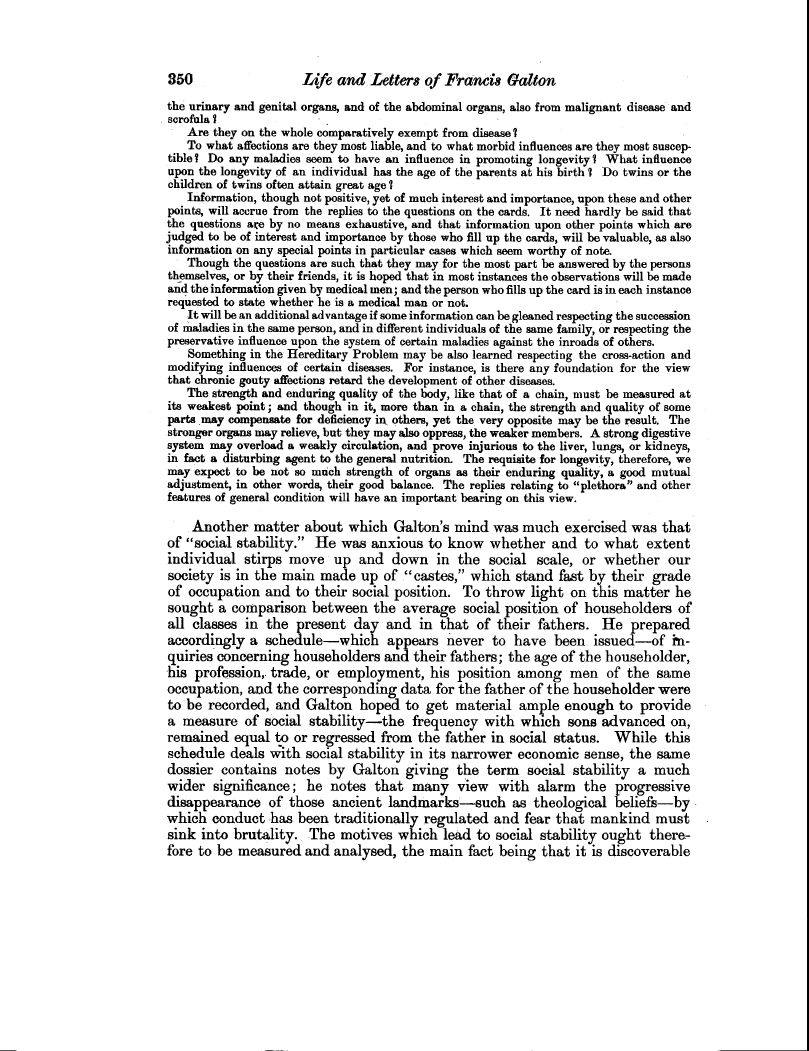350 Life and Letters of Francis Calton
the urinary and genital organs, and of the abdominal organs, also from malignant disease and scrofula?
Are they on the whole comparatively exempt from disease 4
To what affections are they most liable, and to what morbid influences are they most susceptible 4 Do any maladies seem to have an influence in promoting longevity 4 What influence upon the longevity of an individual has the age of the parents at his birth? Do twins or the children of twins often attain great age?
Information, though not positive, yet of much interest and importance, upon these and other points, will accrue from the replies to the questions on the cards. It need hardly be said that the questions are by no means exhaustive, and that information upon other points which are judged to be of interest and importance by those who fill up the cards, will be valuable, as also information on any special points in particular cases which seem worthy of note.
Though the questions are such that they may for the most part be answered by the persons themselves, or by their friends, it is hoped that in most instances the observations will be made and the information given by medical men; and the person who fills up the card is in each instance requested to state whether he is a medical man or not.
It will be an additional advantage if some information can be gleaned respecting the succession of maladies in the same person, and in different individuals of the same family, or respecting the preservative influence upon the system of certain maladies against the inroads of others.
Something in the Hereditary Problem may be also learned respecting the cross-action and modifying influences of certain diseases. For instance, is there any foundation for the view that chronic gouty affections retard the development of other diseases.
The strength and enduring quality of the body, like that of a chain, must be measured at its weakest point ; and though in it, more than in a chain, the strength and quality of some parts.may compensate for deficiency in. others, yet the very opposite may be the result. The stronger organs may relieve, but they may also oppress, the weaker members. A strong digestive system may overload a weakly circulation, and prove injurious to the liver, lungs, or kidneys, in fact a disturbing agent to the general nutrition. The requisite for longevity, therefore, we may expect to be not so much strength of organs as their enduring quality, a good mutual adjustment, in other words, their good balance. The replies relating to "plethora" and other features of general condition will have an important bearing on this view.
Another matter about which Galton's mind was much exercised was that of "social stability." He was anxious to know whether and to what extent individual stirps move up and down in the social scale, or whether our society is in the main made up of "castes," which stand fast by their grade of occupation and to their social position. To throw light on this matter he sought a comparison between the average social position of householders of all classes in the present day and in that of their fathers. He prepared accordingly a schedule-which appears never to have been issued-of inquiries concerning householders and their fathers; the age of the householder, his profession,. trade, or employment, his position among men of the same occupation, and the corresponding data for the father of the householder were to be recorded, and Galton hoped. to get material ample enough to provide a measure of social stability-the frequency with which sons advanced on, remained equal to or regressed from the father in social status. While this schedule deals with social stability in its narrower economic sense, the same dossier contains notes by Galton giving the term social stability a much wider significance ; he notes that many view with alarm the progressive disappearance of those ancient landmarks-such as theological beliefs-by which conduct has been traditionally regulated and fear that mankind must sink into brutality. The motives which lead to social stability ought therefore to be measured and analysed, the main fact being that it is discoverable

